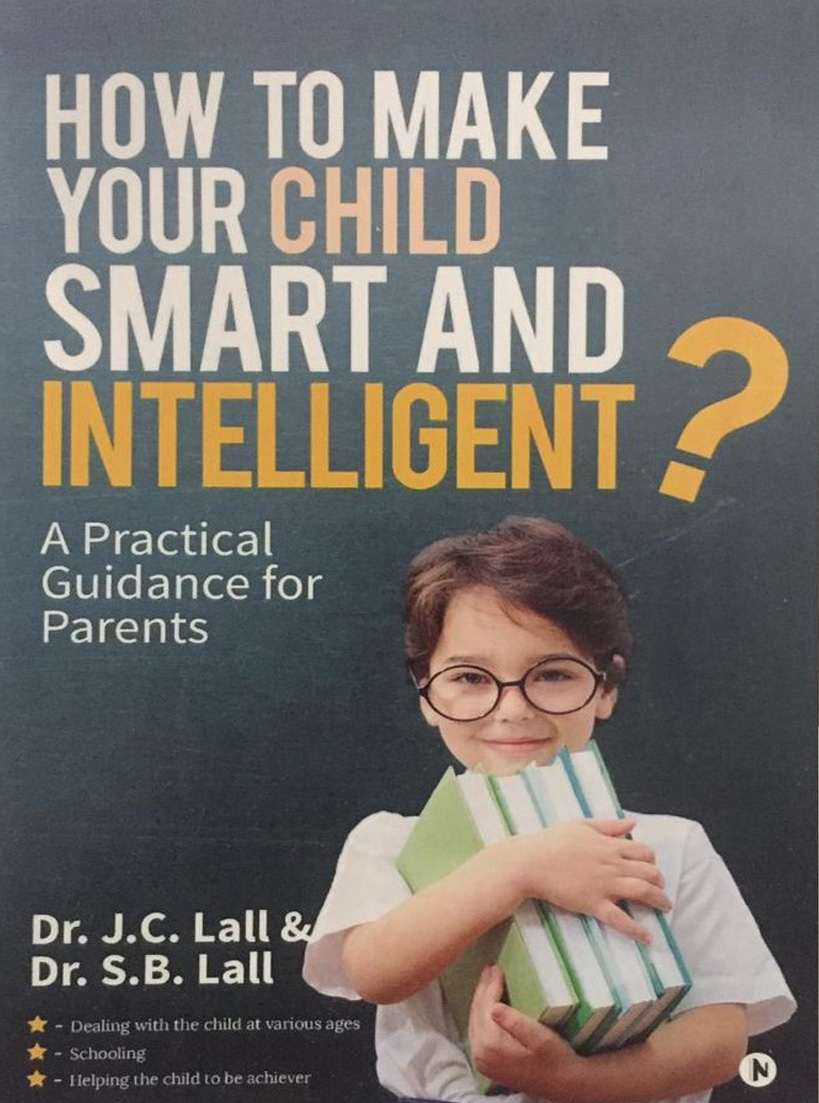How To Make Your Child Smart and Intelligent
- Brand:People Health Series Publication
- Product Name: How To Make Your Child Smart and Intelligent
- Availability: In Stock
- ₹ 500
-
₹ 350
- Shipping Cost : Extra
1. WHY SHOULD YOU RAISE A SMART AND INTELLIGENT CHILD?
» 1.1 Aim of the family
» 1.2 Family expectations
» 1.3 Need for idealistic children
» 1.4 Raising the child in stressful society
» 1.5 Can we make a child brighter?n
2. HOW DOES THE BRAIN WORK?
» 2.1 The brain
» 2.2 Processing the information
» 2.3 Learning and Memory
» 2.4 How does the memory work ?
» 2.5 Stimulating the Brain
» 2.6 What happens when the child is deprived of brain stimulation?
» 2.7 Wisdom and intelligence
» 2.8 Good sleep for good memory
» 2.9 Sleep Requirement
» 2.10 Problems caused by sleeplessness
3. WHAT IS INTELLIGENCE ?
» 3.1 I.Q. (intelligence – Quotient)
» 3.2 Calculation of I.Q.
» 3.3 I.Q. Test score interpretation
» 3.4 Prediction of future carrier on the basis of I.Q.
» 3.5 Smartness – Book smart and street (environment) smart
4. WHAT IS THE BASIS OF MAKING THE CHILD BRIGHTER
» 4.1 Child’s intelligence in changeable
» 4.2 Mental capacity is greatest when brain is growing rapidly
» 4.3 Role of Heredity
» 4.4 Intelligence is not influenced by birth order
» 4.5 I.Q. may be related to breastfeeding
» 4.6 Effect of diet on I.Q.
» 4.7 I.Q. is correlated to head size
» 4.8 I.Q. is on the rise
» 4.9 I.Q. scores have predictive Value
» 4.10 I.Q. versus school attendance
» 4.11 Intelligence in plural and not singular
» 4.12 Early mental stimulation has better effects
» 4.13 Intellectual capacity develops more so before eight years by age
» 4.14 Time limit for easy activation of brain cells
» 4.15 The child is an explorer
» 4.16 The child has inbuilt drive for competency
» 4.17 Create joy in learning and no pressure
» 4.18 Greater the variety of environmental stimuli, greater is the capacity for coping power
» 4.19 Acquiring other language
» 4.20 Existence of sensitive period for specific learning
» 4.21 The child’s brain can be compared with a computer
5. JOY OF PARENTHOOD
» 5.1 From parent's diary
» 5.2 An advice for parents
6. BABY CARE BEFORE BIRTH
» 6.1 Threats to foetal development
» 6.2 Foetal growth in uterus during pregnancy
» 6.3 The Placenta
» 6.4 Behaviour Development
» 6.5 Effects of environment and mother's emotions on her baby
» 6.6 Psychological changes in the mother
» 6.7 Plan your child when you are between the age of 21 years and 35 years
» » a) Pre-marriage planning
» » b) Genetic counseling
» » c) Planning after marriage
» » d) Prenatal Screening and diagnosis
» 6.8 Choose your doctor
» 6.9 Registration for antenatal care
» 6.10 Antenatal Care
» 6.11 Frequency of antenatal visits
» 6.12 Changes in body weight during pregnancy
» 6.13 Maternal factors and diseases affecting the unborn child
» 6.14 Foetal well being assessment in pregnancy
» » a) Assessment of foetal Growth
» » b) Assessment of foetal maturity
6.15 Healthy motherhood for healthy newborn
» a) Nutrition
» b) What should be avoided by expectant mother
» c) Special diets
» 6.16 Exercise and mental well being
» 6.17 Life style
» 6.18 No Self Medication specially first three months of pregnancy
» 6.19 Maternal medication and its effects on the foetus
» 6.20 Safe drugs during Pregnancy
» 6.21 Pregnancy and Vaccination
» 6.22 Prevention of injuries during pregnancy
» 6.23 Avoid X – Ray radiations
» 6.24 Be aware of chemical injuries
» 6.25 Avoid Cigarette Smoking
» 6.26 Effects of Alcohol and Narcotics
» 6.27 Prevent Prematurity
» 6.28 Avoid exposure to contagious diseases during pregnancy
»» a) Cytomegalovirus
»» b) Herpes infection
»» c) Varicella
»» d) German Measles
»» e) Parvovirus
»» f) Human Immune Deficiency Virus (HIV)
»» g) Syphilis
»» h) Toxoplasmosis
»» i) Hepatitis B
» 6.29 Know your and your husband’s blood group for incompatibility
» 6.30 Asphyxia – Effects on foetus
» 6.31 Hypothyroidism
» 6.32 Get mother and baby checked for phenyketonuria (PKU)
7. BABY CARE AFTER BIRTH
» 7.1 Skilled care for your child
» 7.2 Brain insult after birth
»» a) Infections
»» b) Immunization schedule
»» c) Effects of Vaccination
»» d) Injuries
»» e) Burns
»» f) Electrical Injuries
»» g) Drowning
»» h) Foreign bodies
»» i) Difficult breathing and asphyxia
»» j) Nasal Bleeding
»» k) Suffocation
»» l) Toxin
»» m) Metabolic disease
»» n) Cretinism
»» o) Bleeding in the brain
» 7.3 Emergency first aid kit
8. HOW INTERACTION WITH HOME ENVIRONMENT DETERMINES SMARTNESS AND INTELLIGENCE
» a) Making your child street smart
» b) Discipline and behavior
» c) Leadership and encouragement
» d) Self-esteem in a child
» e) Friendship
9. PARENTS ARE CHILD’S FIRST AND BEST TEACHERS
» a) Communication
» b) Speech
10. LEARNING AND ROLE OF PARENTS
» a) Changing the routine
» b) Parents as teacher
» c) Concentration development
» d) Toilet training
12. STIMULATING INTELLECTUAL GROWTH: EIGHTEEN MONTHS TO THREE YEARS
» a) Learning
» b) Developmental Mile-stones 2 – 3 years
» c) Toys & games
» d) Language development
» e) Injury
» f) Discipline and Obedience
» g) Simple games and sounds
» h) Poems
» i) Stories
» j) Books and Reading
» k) Schooling at 3 years
13. INTELLECTUAL GROWTH AT THREE TO SIX YEARS
» a) Reading habit
» b) Language
» c) Perception
» d) Concept formation
» e) Toys
» f) Schooling – regular schooling
» g) How to study
14. SHOULD THE CHILD OF PRESCHOOL AGE (3 – 5 YEARS) BE TAUGHT TO READ
15. ENCOURAGE YOUR CHILD TO BE CREATIVE
» a) How do we recognize creativity
» b) Encouraging Creativity
16. HOW MONTESSORI IDEAS CAN STIMULATE CHILD’S CREATIVITY AT HOME?
17. HOW SINGLE PARENT CAN MAKE CHILD INTELLIGENT AND SMART ?
18. MEDICINES AND THEIR ROLE IN ENHANCING INTELLIGENCE
19. FREQUENTLY ASKED QUESTIONS (FAQ)
20. HELP YOUR CHILD TO BE AN ACHIEVER IN LIFE
21. RAISING YOUR CHILD’S IQ AND MAKING HIM SMART

